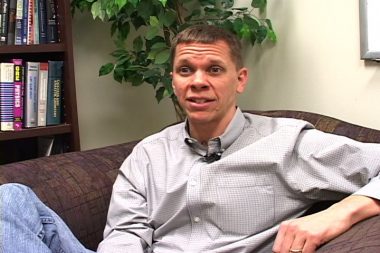Tony Crider, associate professor of physics, is always searching for creative ways to engage students with course material. To help his astronomy students learn about planetary science and the classification of the former planet Pluto, he created a science game called “The Pluto Debate.”

As a result of his work, he has lead several workshops centered on role-playing as an instructional tool and is part of a team of educators who received a $300,000 grant from the National Science Foundation to research game play in science classrooms.
It began in 2007. Crider attended a conference sponsored by the Reacting to the Past consortium, a group of colleges and universities that have pioneered the use of role-playing games in the classroom. In these games, students are assigned specific roles within a scenario, based on texts and historical information, and discuss ideas and issues within that scenario.
At the time of the conference, Crider was participating in the Center for the Advancement of Teaching and Learning Scholars Program, which sponsors innovative faculty teaching and learning initiatives, and was approached by a colleague about creating a science-based reacting to the past game.
“Normally the Reacting to the Past games last for half a semester, so you can only really try them out once or twice a year,” he said. Crider decided to take a different approach and created a one-week game that corresponded to a chapter in the course textbook, allowing science instructors to implement the game without significantly changing their courses.
In the game, students role-play astronomers arguing the definition of a planet at a 1999 debate in New York City and at a 2006 meeting of the International Astronomical Union. They use an online data plotter that allows them to collect information about objects orbiting in space alongside Pluto and use the data to argue that Pluto is or is not a planet in a heated in-class discussion.
The unique appeal of the short-version game garnered national attention. David Henderson, a professor at Trinity College who had written a few Reacting to the Past games, approached Crider in 2009, asking him to join in applying for a three-year grant from the National Science Foundation. The grant would allow for the creation of several short science games, as well as the assessment of the content students master and students’ attitudes towards science.
Since Crider and his colleagues received the grant, “The Pluto Debate” has been played in classrooms and at faculty conferences across the country. “I found out at the last conference that people are playing The Pluto Debate at colleges that I’m not aware of,” Crider said. “I’ve had to build something to collect information about how the game goes at different places.”
As assessment from the National Science Foundation grant enters the final year, Crider says he will continue his involvement as a member of the Reacting to the Past advisory board. “Since I’ll be serving on the board for the next three years, that’s one of my tasks, to take what we’ve learned from the science games and help the longer games improve.”
Currently, educators must attend a workshop or conference to be able to learn how to play the Reacting to the Past games. One of Crider’s goals is to simplify the instructions, making it easier for instructors to implement the games in their classrooms. He said he also hopes to work with Elon professors who teach general studies courses, providing them with games that they may be able to try within their curricula.
– by Kirsten Bennett ’11 and Kellye Coleman ’12


